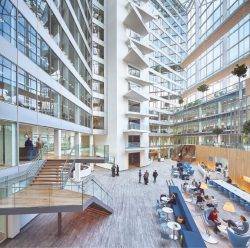February 2, 2018
Workers prize standard of technology over latest office design when moving jobs
 Over half of UK workers (53 percent) say that the standard of technology is a key consideration for accepting a new job role and more than 1 in 3 (37 percent) would decline a job based on poor hardware alone, claims a new survey. The survey of over 2,000 British adults carried out by gadgets and technology e-tailer, LaptopsDirect.co.uk found that having the latest technology was valued more than other office perks, such as flexible working (45 percent), the working environment/decor (39 percent) and staff discounts (33 percent). Nearly a quarter of respondents (74 percent) overall, believe technology makes them more productive at work, with workers in marketing valuing technology the highest, with 84 percent of the votes, followed by those in creative and photographic (81 percent), information and communications (78 percent), professional services (73 percent) and education (71 percent).
Over half of UK workers (53 percent) say that the standard of technology is a key consideration for accepting a new job role and more than 1 in 3 (37 percent) would decline a job based on poor hardware alone, claims a new survey. The survey of over 2,000 British adults carried out by gadgets and technology e-tailer, LaptopsDirect.co.uk found that having the latest technology was valued more than other office perks, such as flexible working (45 percent), the working environment/decor (39 percent) and staff discounts (33 percent). Nearly a quarter of respondents (74 percent) overall, believe technology makes them more productive at work, with workers in marketing valuing technology the highest, with 84 percent of the votes, followed by those in creative and photographic (81 percent), information and communications (78 percent), professional services (73 percent) and education (71 percent).








 The creative team behind the development of the world’s most sustainable building – The Edge in Amsterdam – has announced the launch of a real estate technology company. EDGE Technologies, launched by OVG Real Estate CEO Coen van Oostrom will focus on creating a new generation of buildings which feature the latest innovations in sustainability and wellbeing. Whereas parent company OVG is focussed exclusively on the development of its existing portfolio, EDGE Technologies will focus on both the development and the long-term operations of this new generation of buildings, aiming for a cohesive experience across cities. Each EDGE building will be built and operated on the same technology platform and offer consistent user-centred design, created to serve the needs of today’s fast-changing and demanding workforce. To help achieve this the new company is launching a product that will capture and aggregate data across its properties in order to optimize, measure and inform both the user experience and the building’s environmental performance.
The creative team behind the development of the world’s most sustainable building – The Edge in Amsterdam – has announced the launch of a real estate technology company. EDGE Technologies, launched by OVG Real Estate CEO Coen van Oostrom will focus on creating a new generation of buildings which feature the latest innovations in sustainability and wellbeing. Whereas parent company OVG is focussed exclusively on the development of its existing portfolio, EDGE Technologies will focus on both the development and the long-term operations of this new generation of buildings, aiming for a cohesive experience across cities. Each EDGE building will be built and operated on the same technology platform and offer consistent user-centred design, created to serve the needs of today’s fast-changing and demanding workforce. To help achieve this the new company is launching a product that will capture and aggregate data across its properties in order to optimize, measure and inform both the user experience and the building’s environmental performance. 
 Financial services organisations are reducing the amount of commercial office space they require as they adopt more flexible work styles. This is according to a new report from HOK’s US team,
Financial services organisations are reducing the amount of commercial office space they require as they adopt more flexible work styles. This is according to a new report from HOK’s US team, 






 Three in 10 business professionals think most of their meetings are pointless and nearly half (48 percent) of UK business people admit to having dozed off in a meeting claims global research by Barco ClickShare. The study revealed the true extent of our shared dislike for business meetings, which many respondents believe are poorly run at best or, at worst, completely pointless. Nearly a third of respondents globally said they found less than half of their meetings to be useful, while 30 percent also said they had dozed off in a meeting before. The UK, in fact, led the way in the asleep-in-meeting stakes, with nearly half (48 percent) of all UK respondents saying they’d fallen asleep in meetings. Checking emails and social media during meetings was also extremely common and another indication of disengagement and distraction. Over 70 percent of people said they regularly checked emails during meetings, while 37 percent access social media.
Three in 10 business professionals think most of their meetings are pointless and nearly half (48 percent) of UK business people admit to having dozed off in a meeting claims global research by Barco ClickShare. The study revealed the true extent of our shared dislike for business meetings, which many respondents believe are poorly run at best or, at worst, completely pointless. Nearly a third of respondents globally said they found less than half of their meetings to be useful, while 30 percent also said they had dozed off in a meeting before. The UK, in fact, led the way in the asleep-in-meeting stakes, with nearly half (48 percent) of all UK respondents saying they’d fallen asleep in meetings. Checking emails and social media during meetings was also extremely common and another indication of disengagement and distraction. Over 70 percent of people said they regularly checked emails during meetings, while 37 percent access social media.






 Half of SMEs (50 percent) questioned in a new survey have changed the way that they recruit their staff as a result of Brexit. The Albion Growth Report 2017 of more than 1,000 SMEs suggests that for businesses which have changed their strategy as a result of Brexit, 15 percent have decreased recruitment resources, 10 percent have begun recruiting in different ways and 9 percent have made redundancies. A difficulty in finding skilled staff is one of the biggest barriers to growth, behind broader political uncertainty and cash flow, which the research claims could lead to a potential war for talent which is likely to become more intense in the post-Brexit environment. By contrast, SMEs view difficulty in finding unskilled staff as the least significant barrier to growth. The report finds that nearly two thirds (65 percent) of SMEs believe their business lacks expertise. More than a quarter (26 percent) of businesses lack marketing talent, followed by business planning (19 percent), IT (17 percent), and software developers and technology specialists (17 percent). Despite critical skills deficits, only a third of SMEs (33 percent) are currently hiring new employees.
Half of SMEs (50 percent) questioned in a new survey have changed the way that they recruit their staff as a result of Brexit. The Albion Growth Report 2017 of more than 1,000 SMEs suggests that for businesses which have changed their strategy as a result of Brexit, 15 percent have decreased recruitment resources, 10 percent have begun recruiting in different ways and 9 percent have made redundancies. A difficulty in finding skilled staff is one of the biggest barriers to growth, behind broader political uncertainty and cash flow, which the research claims could lead to a potential war for talent which is likely to become more intense in the post-Brexit environment. By contrast, SMEs view difficulty in finding unskilled staff as the least significant barrier to growth. The report finds that nearly two thirds (65 percent) of SMEs believe their business lacks expertise. More than a quarter (26 percent) of businesses lack marketing talent, followed by business planning (19 percent), IT (17 percent), and software developers and technology specialists (17 percent). Despite critical skills deficits, only a third of SMEs (33 percent) are currently hiring new employees.








